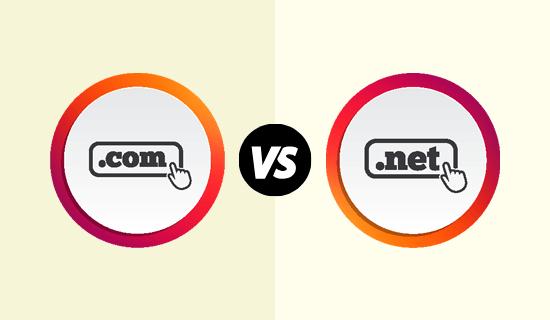.com is the universally trusted choice for most businesses, offering maximum credibility and memorability. .org works best for nonprofits and mission-driven organizations. .net serves as a solid alternative for tech companies or when .com isn’t available. Choose based on your business type, target audience, and brand perception goals rather than SEO concerns.
The Fundamental Differences
.com (Commercial)
Originally designed for commercial enterprises, .com has evolved into the internet’s default extension. It represents 53% of all registered domains globally and is synonymous with online credibility. .com domains work for virtually any website type—businesses, blogs, e-commerce stores, and personal brands.
.org (Organization)
Initially created for nonprofit organizations, .org maintains its association with mission-driven entities, charities, educational institutions, and community groups. While anyone can register a .org domain, it still signals transparency, purpose, and non-commercial intent to users.
.net (Network)
Originally intended for network infrastructure companies and tech services, .net has broadened its appeal to technology companies, startups, and web-based services. It’s often chosen as a professional alternative when the desired .com domain is unavailable.
Trust and Credibility Comparison
Research involving 1,500 participants revealed significant differences in user perception:
- .com achieved the highest trust score (3.5/5), establishing itself as the most credible extension
- .co followed closely (3.4/5), while .org and .us tied at 3.3/5
- .net received a moderate trust rating, particularly strong for tech-focused businesses
- When users misremember URLs, they default to .com 57 times more often than any other extension—3.8 times more than the second-place .org
This data confirms that .com domains benefit from an inherent “trust premium” that can translate into higher click-through rates and user engagement.
SEO Impact: The Reality
All three extensions (.com, .net, .org) are treated equally by Google’s ranking algorithm. Domain extension itself is not a direct ranking factor, meaning:
- No technical SEO advantage exists for any of these TLDs
- Content quality, backlinks, page speed, and user experience matter far more than extension choice
- Indirect SEO benefits may occur through improved click-through rates due to user trust and memorability
The key insight: choose your extension based on branding and user perception, not SEO concerns.
Cost Analysis
Domain pricing remains relatively stable across these established extensions:
| Extension | First Year Cost | Annual Renewal |
|---|---|---|
| .com | $8-$20 | $12-$18 |
| .net | $10-$17 | $14-$20 |
| .org | $9-$16 | $12-$20 |
.com typically costs slightly more due to its popularity and demand, but the price difference is minimal—usually just a few dollars annually. Premium versions of any extension can cost significantly more depending on keyword value and demand.
When to Choose Each Extension
Choose .com When:
- Building a commercial business or e-commerce site
- Targeting a global audience with broad appeal
- Maximizing trust and memorability is crucial
- Budget allows for the premium associated with high-demand names
- Long-term brand building is the primary goal
Choose .org When:
- Operating a nonprofit organization or charity
- Running educational or advocacy initiatives
- Building community-focused platforms
- Signaling transparency and mission-driven purpose
- The .com version might confuse your non-commercial mission
Choose .net When:
- Operating a technology or networking business
- The desired .com domain is unavailable or prohibitively expensive
- Targeting tech-savvy audiences who appreciate the network connotation
- Building SaaS platforms, hosting services, or online tools
- Seeking a professional alternative with moderate cost
Availability and Competition
Availability decreases in this order: .org and .net (easier) → .com (most competitive). With .com domains, finding your preferred name often requires:
- Creative variations or longer phrases
- Higher investment in premium or aftermarket domains
- Brand adaptation to available alternatives
.net and .org offer better availability for short, brandable names, making them attractive for startups and new businesses seeking memorable domains without premium costs.
Strategic Considerations
Brand Protection Strategy
Many established businesses register multiple extensions (.com, .net, .org) to:
- Prevent competitor acquisition of similar domains
- Redirect traffic to their primary site
- Maintain brand consistency across extensions
International Considerations
.com provides universal recognition without geographic limitations, while .org and .net maintain global credibility but with specific sector associations. For businesses planning international expansion, .com typically offers the broadest appeal.
User Behavior Patterns
Studies show users exhibit “extension bias”—when unsure of a URL, they default to trying .com first. This behavior creates a natural advantage for .com domains in:
- Direct navigation traffic
- Word-of-mouth referrals
- Brand recall situations
Industry-Specific Recommendations
E-commerce & Retail: .com provides maximum trust for transactions
Technology & SaaS: .net conveys technical credibility
Nonprofits & Education: .org signals mission alignment
Professional Services: .com for broad appeal, .net for tech-focused services
Startups: Consider budget and long-term goals—.com for maximum flexibility, .net/.org for cost savings
The choice between .com, .net, and .org ultimately depends on your business objectives, target audience, and budget rather than SEO considerations. .com remains the gold standard for commercial ventures seeking maximum credibility and memorability, despite higher costs and limited availability. .org serves mission-driven organizations that benefit from its nonprofit associations, while .net provides a professional alternative particularly suited for technology companies or when .com isn’t feasible.
Remember that domain extension is just one element of your digital strategy—focus primarily on creating valuable content, building strong user experiences, and developing your brand identity regardless of which extension you choose.
